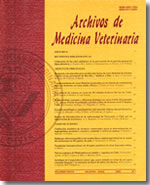Hemolytic anemia caused by hereditary pyruvate kinase deficiency in a West Highland White Terrier dog
Main Article Content
Abstract
Inherited erythrocytic pyruvate kinase (PK) deficiency is an autosomal recessive hemolytic disorder described in dogs and cats. Pyruvate kinase is one of two key-regulatory enzymes in the anaerobic glycolytic pathway, and its deficiency causes premature destruction of the ATP-depleted red cells. This case study reports the clinical and laboratory findings in a West Highland White Terrier (WHWT) dog with a life-long history of weakness and exercise intolerance from Brazil. The dog was found to have persistently profound pallor, a highly regenerative hemolytic anemia and osteosclerosis. PK deficiency was confirmed by a breed-specific DNA test for the previously described 6 bp insertion at 3' end of exon 10 in red blood cell (RBC) R- PK gene sequence. The dog was euthanized at 20 months of age due to the deterioration of its clinical condition including anemia and blood incompatibility. Other PK-deficient WHWTs have lived as long as 9 years. Hereditary red cell defects are important differential diagnoses for chronic hemolytic anemias in younger animals after excluding immune-mediated and infectious causes. Furthermore, purebred dogs for which DNA tests for hereditary diseases are available should be screened prior to breeding in order to limit the spread of the mutant allele and to avoid future production of PK-deficient animals.

